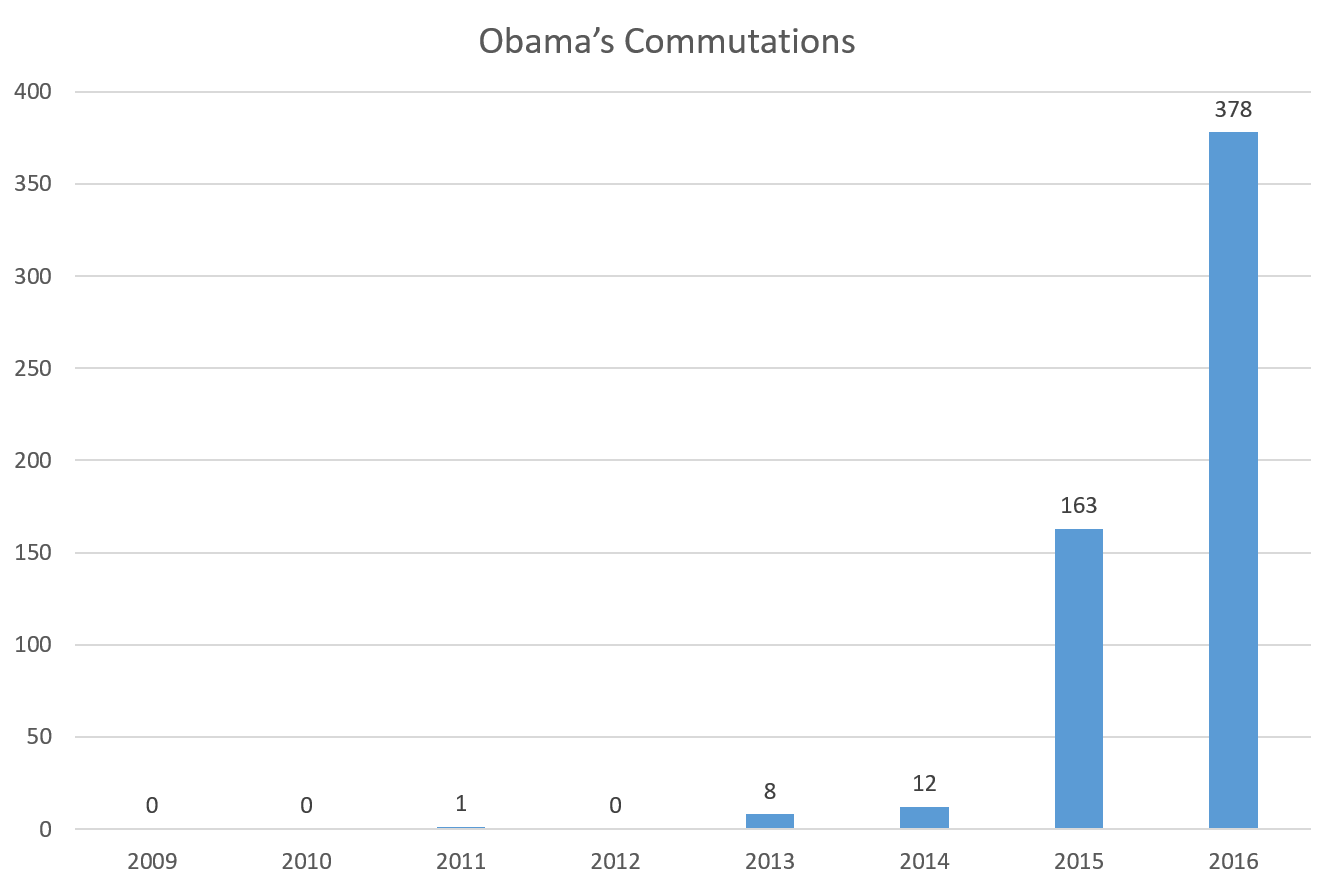Obama's Record-Breaking Commutations Leave Much Work to Do
In raw numbers, the president has far surpassed his recent predecessors, but his petition approval rate is only middling.
Yesterday, as Scott Shackford noted, President Obama commuted 214 sentences for drug offenses, including 67 life sentences. According to clemency expert P.S. Ruckman Jr., that is the largest number of commutations ever granted in a single day, surpassing the previous record of 151 set by FDR in 1935. Obama's new total, 562, is more commutations than were granted by his nine most recent predecessors combined and more commutations than were granted by any single president since Calvin Coolidge, whose total was 773.
In terms of raw numbers, Obama blows his recent two-term predecessors out of the water. With about six months left to go in his administration, he has issued more than 50 times as many commutations as George W. Bush (a self-described "compassionate conservative"), 43 times as many as Ronald Reagan, 12 times as many as Dwight Eisenhower, almost five times as many as Harry Truman, nine times as many as Bill Clinton and Richard Nixon, and more than twice as many as Lyndon Johnson. Obama, who shortened just one sentence in his first term and just 20 in the first two years of his second term combined, is clearly trying to make up for lost time, and he deserves credit for that.

But as measured by the percentage of petitions granted, Obama's record is still only middling compared to other recent presidents. As of June 6, he had received 23,325 commutation requests, in addition to about 1,000 that were pending when he took office. He has approved 2.3 percent of them, which is better than the Bushes, Reagan, or Clinton but still less than Jimmy Carter's petition approval rate or Gerald Ford's and about half as high as Nixon's.
Part of the problem is that Obama has received a lot more petitions than his predecessors but has not devoted enough resources to processing them, despite his apparently sincere interest in ameliorating draconian sentences. As Lauren Krisai noted here last June, understaffing was one of the reasons that Pardon Attorney Deborah Leff, appointed in 2014, cited for resigning last January:
In her resignation letter to Deputy Attorney General Sally Yates, Leff wrote that the Justice Department had "not fulfilled its commitment to provide the resources necessary for my office to make timely and thoughtful recommendations on clemency to the president." According to USA Today, "Leff said Yates had overruled her recommendations in an increasing number of cases—and that in those cases, the president was unaware of the difference of opinion. "
Leff also complained that Obama was neglecting pardons—which clear people's records, typically long after they've completed their sentences, rather than shortening their prison terms—to focus almost exclusively on commutations. Obama has issued just 70 pardons so far.
The Office of the Pardon Attorney had only 10 lawyers to review clemency petitions until this year, when it hired 16 more. With 26 lawyers and about 13,000 clemency petitions still pending (including requests for pardons as well as commutations), each attorney is responsible for handling about 500 cases, or 2.6 per working day remaining until Obama leaves office. And that's not including any additional petitions forwarded by Clemency Project 2014, the network of volunteer lawyers who are trying to assist the Office of the Pardon Attorney at the administration's request.
Those volunteers have rejected around 96 percent of the candidates they have reviewed because they did not meet the Justice Department's excessively picky criteria, which among other things rule out prisoners who have served less than 10 years, prisoners who would get the same sentence under current law, and prisoners with more than a minimal criminal history. Krisai noted that even prisoners who meet the DOJ criteria have to make it through a series of formidable bureaucratic obstacles: The severely understaffed Office of the Pardon Attorney decides which files should be sent to Deputy Attorney General Yates, who decides which ones should be fowarded to White House Counsel W. Neil Eggleston, who decides which ones merit the president's attention.
In 2014, when the administration signaled a new openness to commutation requests, one official suggested that Obama's final commutation total could be in the "thousands," which seems quite unlikely at this point. Even if Obama granted 214 commutations a month from September until January, he would fall short of that prediction.
Obama has shown more interest in the problem of excessively punitive sentences than any of his recent predecessors. But the upshot of his late start, the DOJ's unnecessarily strict criteria, understaffing, and multiple layers of review is that many people who do not belong in prison will remain there—people who might have been freed if the president had given commutations more sustained attention and resources. "While the commutations President Obama granted today are an important step forward," St. Thomas University law professor Mark Osler told USA Today, "they remind us of how much more work this administration has to do if it is to grant relief for every person eligible."


Show Comments (21)